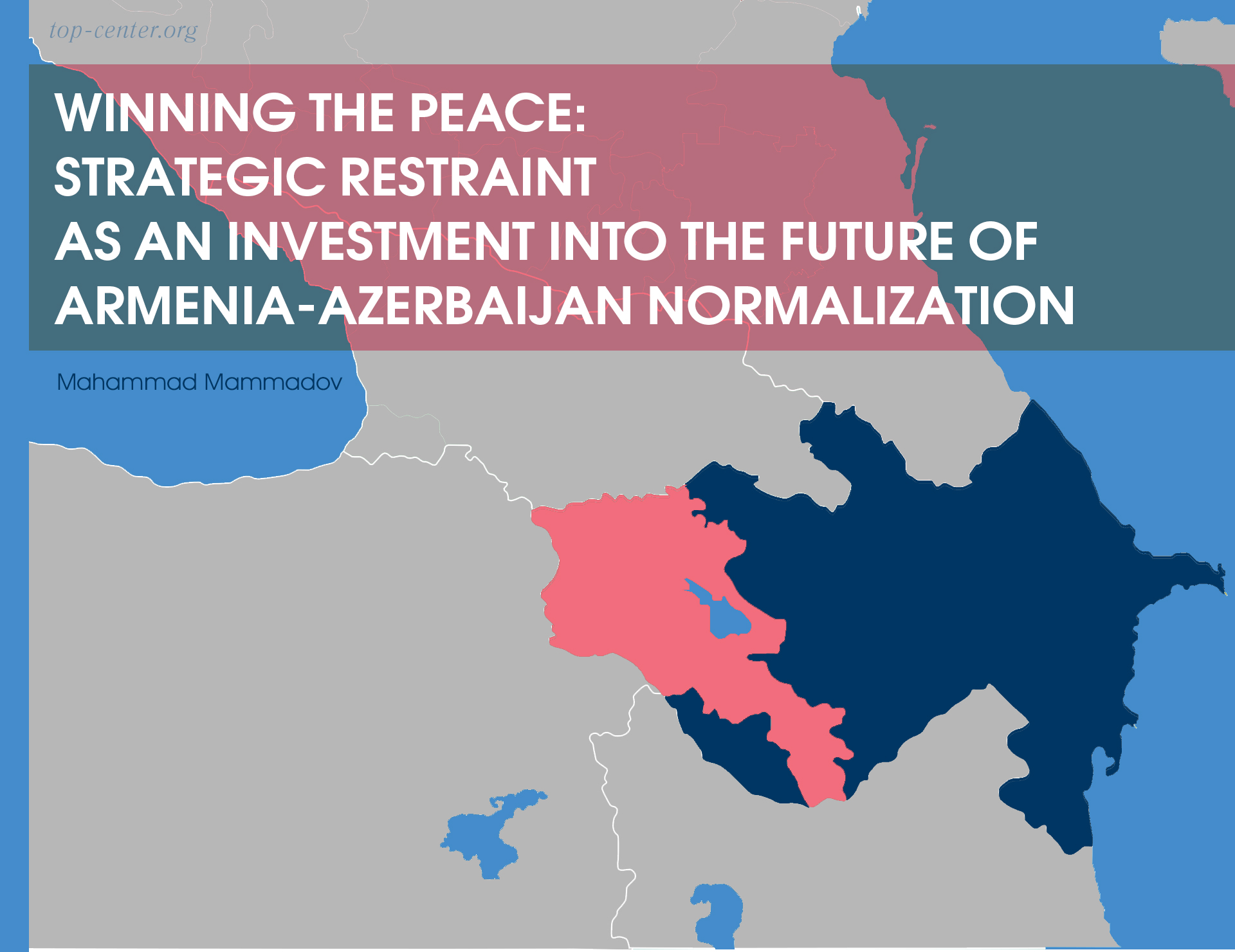Winning the peace: Strategic restraint as an investment into the future of Armenia-Azerbaijan normalization

On September 19, Azerbaijani armed forces in a 24-hour-long military operation stormed through the positions of local Armenian units in the Karabakh region, eventually forcing the separatist entity to surrender. This time Armenia did (could) not come to the help of Karabakh Armenian militias while Russian peacekeepers stood aside. On September 28, the leader of the self-declared republic signed a decree to dissolve all state institutions by 1 January 2024, practically ending 30 years of separatism in Azerbaijani territory.
On the one hand, this opens the door for constructive peace negotiations between Azerbaijan and Armenia as the latter’s politico-economic support to and military presence in the Karabakh region have long been one of the main obstacles to achieving sustainable peace. A meaningful step forward was taken on September 26 when Hikmat Hajiyev, assistant to the Azerbaijani president, met the secretary of the Security Council of Armenia Armen Grigoryan in Brussels. This meeting, facilitated by EU Council President Charles Michel, discussed concrete steps to advance the Armenia-Azerbaijan negotiations on border delimitation, security, connectivity, humanitarian issues, and a comprehensive peace treaty. However, on the other hand, armed resolution of the conflict raises uncertainty not only for Armenia and Azerbaijan but also for third powers with stakes in (in)stability in the South Caucasus about the parties’ next moves that carry the risk of sparking an arms race, hence aggravating the already worsening regional security dilemma.
Now that Azerbaijan has restored its full sovereignty over Karabakh, the question arises as to what Baku will do with its newly acquired power. Will Azerbaijani leadership push forward with opening an extraterritorial corridor to its Nakhchivan exclave through southern Armenia or will it apply strategic restraint and lock in favorable arrangements with the Armenian side that cement its gains beyond the zenith of its power? In the aftermath of the Second Karabakh War Armenia’s Syunik region has been inching toward the geopolitical spotlight as Azerbaijan’s claims to a transport corridor through Armenia raised ruffled feathers in Iran and pushed the EU to deploy a civilian monitoring mission to the Armenian side of the Armenia-Azerbaijan border. With the Lachin corridor under its control, Azerbaijan now agrees to Armenian sovereignty over the transport route to Nakhchivan and expects Armenia and Russia to agree on who will control the transit process. Recently, Azerbaijani officials came up with reassuring statements that Baku does not aim to build up on its victory to lay claim to Armenian territory. On September 29, President Aliyev said Azerbaijan recognizes Armenia’s territorial integrity and “we mean it because if we had other intentions, on September 20, things would not have stopped”. Similarly, in a tweet on September 29 presidential assistant Hikmet Hajiyev declared the central tenet of Azerbaijan’s new regional policy: “Win the peace”.
However, winning the peace in relations with Armenia might prove to be a harder feat to pull off than winning the war at the end of a decades-long conflict, especially if one takes into account the complex geopolitical context. Baku’s eventual battlefield victory in Karabakh was built on the successful use of domestic resources and careful reading of the external environment. Its far superior economic capabilities were efficiently mobilised to establish a military edge over Armenia which was widened thanks to Yerevan’s growing military-economic dependence on an increasingly isolated Russia. Deepening partnerships with alternative power poles, especially with Türkiye and Israel, upgraded Baku’s military capabilities to fight a qualitatively different level of warfare. The fact that the international community recognized Karabakh as part of Azerbaijan provided a legal ground for returning the territories when the time was ripe for it. Last but not least, the relatively permissive international environment let Baku dominate the Armenian side during the war and eventually take full control of Karabakh.
To win the peace, however, Azerbaijan’s main challenge lies in its own success. With the Karabakh conflict over, Baku is in a position to punish Armenia for its past behavior by taking a maximalist approach to secure its interests for the foreseeable future. Moving the center of conflict away from its territory to that of the enemy looks like a natural option that would push the opposite side into further concessions for building a new status quo for the post-Karabakh war order. But the historical record shows that even if this vae victis (woe to the vanquished) approach to the defeated side and failure to engage it in an inclusive security system brings certain benefits in the short term, it is highly unsustainable in the long run, and carries the risk of igniting vicious cycle of violence and instability for all sides. One does not need to go far to find examples. Armenia’s three-decades-long occupation of Azerbaijani territories and creation of a buffer zone to maximize its security, refusing to make concessions, now renders Yerevan’s own survival as a sovereign state hostage to the strategic interests of its great power partners and puts it at the mercy of its regional rivals. The ball is in Baku’s court and the type of order it will forge out of the cauldron of recent tensions in cooperation with regional and external powers hinges to a great extent on its ability to restrain its power and bind Armenia to long-term commitments to peace and stability in the region.
Azerbaijani interests would be well served if it applied limitations on its use of power in exchange for a predictable normalisation with Armenia. Firstly, this will contribute to decreasing the costs of maintaining stability in the region which is essential for realizing Azerbaijan’s potential as a pivotal energy partner and transport hub for the Western countries. As the rules-based international order is increasingly in tatters, Baku may conserve its power to focus on shielding itself from bigger regional challenges such as Iran. Contrarily, excluding Armenia from the decision-making process for a regional order and opting for coercive pressure to tame it into submission would invite balancing behaviour from regional and external powers that would substantially increase the costs and could even isolate Baku in the West. Secondly, binding Armenia into a mutually beneficial agreement would serve as a geopolitical investment in the future. If Azerbaijan achieves entrenching certain rules of engagement with Armenia in bilateral and multilateral formats, they would still work in its favour even as the regional balance of power shifts against it in the coming years.
Upcoming talks on border demarcation, the opening of transportation routes, and the signing of the comprehensive peace treaty provide an ultimate ground for establishing the contours of a predictable normalization with Armenia. It will not only cement Baku’s gains in the Second Karabakh War but will also keep its image as a reliable partner for the West and decrease Russia’s ability to manipulate crises in Armenia-Azerbaijan relations for bolstering its hegemony in the South Caucasus. Apparently, many in this context will also depend on Armenia’s willingness or ability to constructively engage in the process as its growing domestic polarisation and overdependence on external patrons have the potential to disrupt the whole process. Here, the elephant in the room is the deepening zero-sum game between Russia and the West over the sphere of influence in the South Caucasus that increases the probability of miscalculation for all parties, especially for Armenia and Azerbaijan, with grave consequences for regional peace and stability. In the end, Azerbaijan is not a great power that has won a major power war to shape a regional order according to its will. To chart a new and peaceful way forward will require proactive contribution from those actors who are invested in the idea of a peaceful South Caucasus. For now, it is mostly Baku that sits in the driver’s seat and it needs to tread carefully to win the peace for the region while maximizing its security interests.







